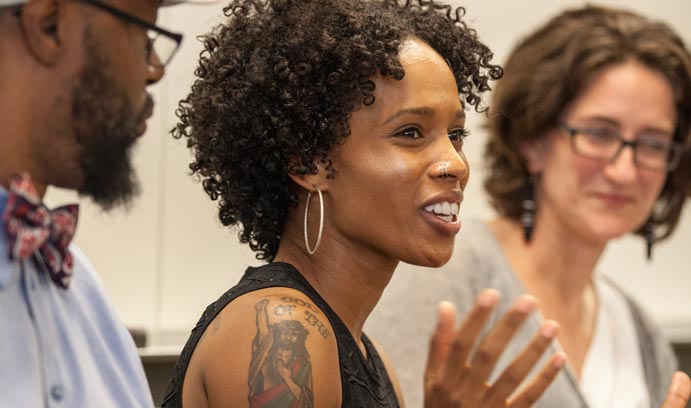This is the second in a series of essays on social justice, civil rights and the criminal justice system written by faculty engaged in the MLK planning process. This year's celebration will include a book discussion group, lectures and the 2014 Kenner Lecture: The Race Card Project with NPR's Michele Norris at 8 p.m. Thursday, Jan. 30 in Baker Hall.
“To the livin’ we owe respect, to the dead we only owe the truth”
– Talib Kweli, “Gutter Rainbows”
I rarely, if ever, use the word “justice” – as in “justice system.” The word seems to lie somewhere between two other words, respect and truth—words that my black, female presence sees too little of and remains suspicious exists, respectively, at all. I tend to use the phrase “injustice system” to depict the manner in which we have yet to see a fully realized system of justice in this land we like to call a “free country.” Usually we seek “justice” after the fact, too late, when a body has died, or when an atrocity has been committed. This kind of justice listens for the voices of the dead; but they remain dead. Is that justice? What is justice and might the very justice we seek be impossible in a system that historically and rhetorically ritualizes an ideal that it has rarely, if ever, made good on? Can there be justice for the dead – for Trayvon Martin (17 year old young black male murdered in 2012 while walking to the store)? For Emmett Till (14 year old young black male who was murdered in 1955 after being accused of flirting with a white woman in Mississippi)? For those murdered tomorrow, in a year, a century? And how might we show respect to the livin’?
French philosopher Jacques Derrida suggested that there is, in fact, no justice for the dead – but we can, I believe, seek justice for the living even if we only know what it does not look like. Derrida reminds us through his idea of the trace (which holds the condition of possibility for meaning itself), that possibilities are found in the “movement” of difference expressed in and through undecidability, ambiguity, and paradox. When it comes to this idea of justice – in the spirit of Derrida, we are called to be, faithfully unfaithful – that is, believe and question concurrently, a way to affirm yet recast the heritage otherwise so that it can live.
Derrida asks, “What does it mean to reaffirm? It means not simply accepting this heritage but relaunching it otherwise and keeping it alive.” In this spirit, we are called to not necessarily celebrate a dream realized – or the hope attained – but rather, to understand that while some saw the possibility of an American dream (i.e., Dr. Martin Luther King Jr.) – others experience(d) an American nightmare (i.e., Malcolm X).
Perhaps, the perpetual legacy of injustice in a land said and called free challenges us to hold out for the impossible possibility of the dream’s arrival – that is, in a Derridean sense – the dream ‘to come’ and the nightmare to face. Isn’t this why we call our heroes freedom fighters...because it hasn’t arrived yet? Angela Davis and Lupe Fiasco are two of these freedom fighters, not in the sense of defending a false freedom giving a façade of justice to the slain, but a push and demand for freedom that might finally show respect to the living; to the idea of justice. They are the faithfully unfaithful reaffirmation that though no dream has been found, the idea—though fraught with so much pain, death and murder—is a dream worth holding and preserving because it is a human dream.
Far too often, it’s easy to stop at the dream that we have yet to fulfill– hence, the question at hand is not “have we arrived – have we fulfilled the promise?” To answer such a query and more so to resolve forecloses any kind of potential democratic possibilities. It is for this reason – we must not look to the hope in the dream – or the dream in the hope – but rather the ‘holla’ in the hope that continually pushes us to ask the hard questions as we move towards a life and society fully examined in a land where not all laws are created equal – where injustice masquerades as justice somewhere between respect and truth.
- Monica Miller, assistant professor of religion studies and Africana studies
Posted on:
Thursday, January 16, 2014



